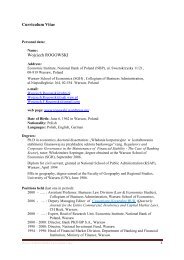EMERGING
Emerging Markets:
Emerging Markets:
You also want an ePaper? Increase the reach of your titles
YUMPU automatically turns print PDFs into web optimized ePapers that Google loves.
<strong>EMERGING</strong> MARKETS:<br />
A Review of Business and Legal Issues<br />
a US-based company which produces medical diagnostics equipment Dade Behring, for EUR<br />
5 billion. This step means the continuation of the strategy of his predecessors, which assumed<br />
that Siemens would win the position of the “global leader in clinical medical diagnostics”. 1<br />
The comparison of Fit42010 strategy announced by Löscher (2007) with the Fit4More<br />
strategy of Kleinfeld (2005) reveals insignificant changes. Both strategies concentrate on the<br />
same four areas: Operational Excellence, People Excellence, Corporate Responsibility and<br />
Performance and Portfolio. The new strategy, scheduled for implementation in 2008-2010, is<br />
only different due to emphasis on compliance issues and climate protection (in the area of<br />
corporate responsibility),focus on three areas of activity (energy and environmental<br />
protection, automatics and industrial and public infrastructure, healthcare), and the stress on<br />
the optimal effectiveness of equity (ROE at the level of 14-16%). Other objectives remain<br />
virtually unchanged. The corporation’s mission was supplemented with the observance of the<br />
values of the corporate code of ethics, and benchmarking was recommended with regard to<br />
the transparency of business activities and compliance with corporate rules. 2<br />
Conclusions<br />
The synthesis of information performed in the article allowed not only for learning<br />
about the paths of corruption, methods of its detection and attempts to overcome it, but also<br />
outlined corporate governance and the tendencies of changes in German corporations. The<br />
knowledge of those facts gives rise to questions about the reasons of corruption, its<br />
repeatedness and, first of all, about the link between corruption and the condition of corporate<br />
governance. Why was such a great company as Siemens, which employed the best people and<br />
vaunted innovativeness of its products, involved in corruption? Why does corruption occur<br />
repeatedly in the history of the company? What are the reasons for such a situation? To what<br />
extent is corruption a crime, and when is it just business as usual? Will the means employed<br />
to fight it be effective this time?<br />
Cf. http://www.ehealtheurope.net/news/2917/siemens_acquire_dade_behring<br />
2 According to www.siemens.com<br />
Page 42 Volume 1, April 2009




